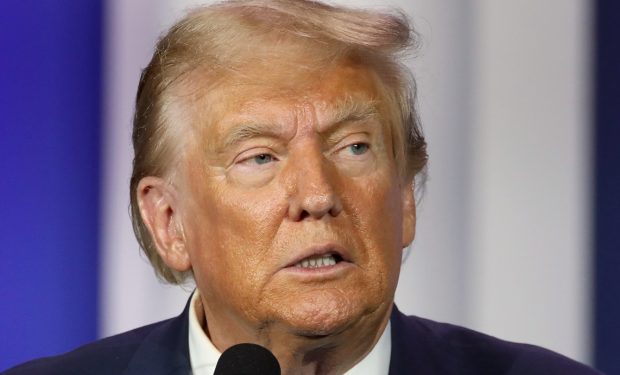“This is how the world ends, not with a bang but with a whimper” goes the famous line from T. S. Eliot‘s poem “The Hollow Men.”
Eliot’s sentiment has much in common with the philosopher Hannah Arendt‘s seminal study in fascism and complicity — The Banality of Evil — which examines how “terrifyingly normal” people failed to rise up against, and instead participated in, the crimes perpetrated by the Nazis.
Both writers communicate — and lament — the notion that the worst can happen and not make a sound.
Some social critics see the same banal complicity happening in the present, with corporate media repeatedly failing to focus on former President Donald Trump‘s increasingly violent, threatening rhetoric. Others contend that such concerns are overblown.
But critics like writer Hal Corley — pointing to Trump’s recent vision of “one really violent day” by lawless police to teach criminals who’s boss — insist that some of Trump’s statements go so far beyond the pale that they should be front page news — bangs, not whimpers.
[NOTE: Trump’s use of violent rhetoric is not in dispute — Trump owns it and boasts about it. Of the purported prohibition on police, who Trump claimed “aren’t allowed to do their jobs,” he said: “Now, if you had one really violent day … one rough hour, and I mean real rough. The word will get out and it will end immediately.”]
The Harris campaign and other online commentators pushed the story.
Trump says his idea for stopping crime is to allow for “one really violent day”: “One rough hour, and I mean real rough…” pic.twitter.com/6XeVXL6R8b
— Kamala HQ (@KamalaHQ) September 29, 2024
But Corley charges that the mainstream media’s failure to adequately cover something as outrageous as Trump’s call for a day of extralegal police violence should trigger a national examination of his fitness for office.
Instead, Corley complains, Trump’s “really violent night” statement is treated as “Trump being Trump” — and subject to both-sides-ism and to the old saw to “take Trump seriously but not literally.”
On the other side, arguing against Corley’s alleged alarmism, one commenter writes that “even those rags know hyperbole when they see it.”
Because even those rags know hyperbole when they see it. Whereas you are incapable of lateral thinking or understanding non-literal words.
— Timothy Williams (@timios) October 1, 2024
I believe @Mediaite must take note: An unknown poster, whose scold to the @nytimes and @washingtonpost for their failure to cover Trump's "one really violent day" remark earned 20k confirming likes and half as many reposts in 48 hrs. 20,000+ outraged readers are the story, too. https://t.co/qwbhHFump4
— Hal Corley (@Halcyon270) October 1, 2024
Trump deliberately makes it a challenge to cover the breadth of his threats and insinuations: He has recently said he will prosecute his political rivals once in office and imprison them. He has targeted Ohio Haitians with false narratives to stir hatred and fear. He has menacingly told his followers that if he loses the election, American Jews “would have a lot to do with it.” Last year Trump floated the idea that police should shoot shoplifters.
Corley and others ask why these threats aren’t front and center at the New York Times and Washington Post, and wonders why Rolling Stone, primarily a music magazine, is nearly alone in prominently featuring Trump’s latest call for police violence.
[NOTE: The Post did cover the story, relaying Trump’s words exactly, if not prominently. The Times did too, with its anodyne subhead reading: “The remarks were the latest example of his praise for executive power and force in imposing order.”]
NBC News, evincing Corley’s point, summarized the speech as Trump talking about “shoplifting.”
.@NBCNews framed a call for a day of violence as "Trump speaks on ending shoplifting." A clear pandering to the fears/biases of non-urban Americans. https://t.co/yUGt148CH3
— Hal Corley (@Halcyon270) September 30, 2024
